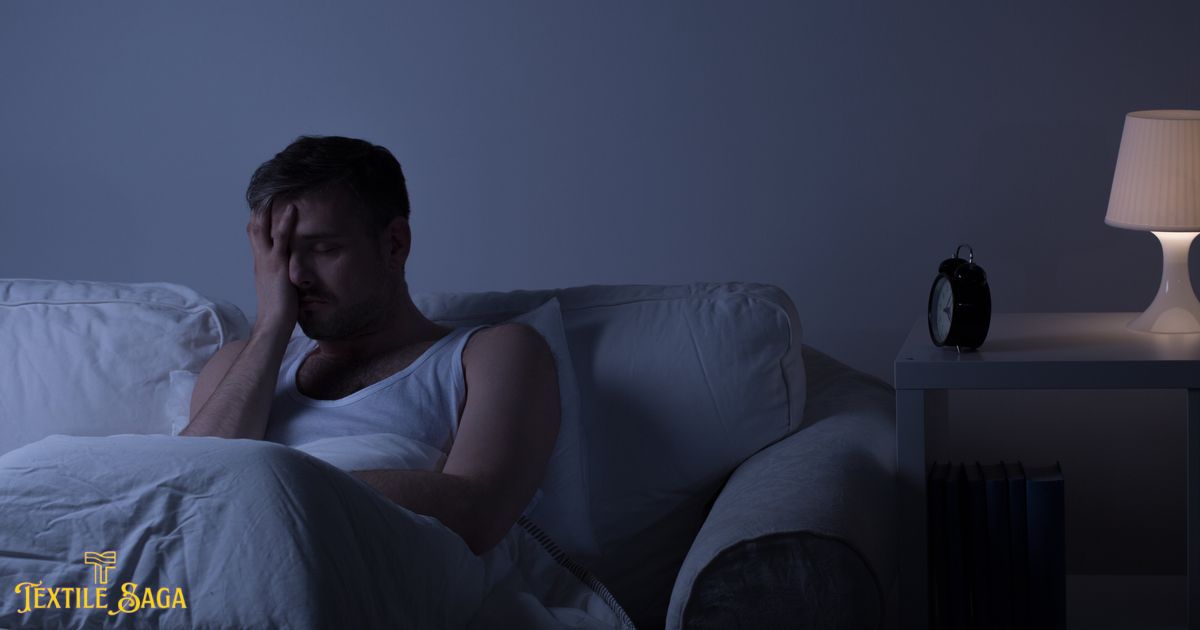“How I Sleep at Night Knowing I’m Failing All My Classes by Tymoff” is book that discusses feeling okay even when things aren’t going well in school. It talks about finding peace even when struggling with grades.
In book Tymoff shares his experiences of failing classes. He still finds ways to sleep at night peacefully. It focuses on accepting mistakes and learning to be okay with them. In the article below we will discuss about all the aspects.
Understanding the Impact of Academic Stress on Sleep
Academic stress can greatly affect sleep. When students feel stressed about schoolwork they often find it hard to relax. This makes falling asleep difficult. Worrying about exams, assignments and grades can keep mind active at night.
Poor sleep at night can also make academic stress worse. Without enough rest students feel tired and less focused. This can lead to more stress about completing tasks. It’s important for students to find ways to manage stress.
Reasons Behind Insomnia When Failing a Class
Failing a class can cause insomnia for several reasons. Below are some key reasons which may cause insomnia when failing a class:
- Students may feel stressed and anxious about their grades.
- They might worry about disappointing parents or teachers.
- They might feel like they are not good enough.
- The pressure to improve and avoid failing again can cause sleeplessness.
What to Do After Failing a Class?
Failing class can be tough. First stay calm. Don’t panic. Talk to your teacher about what went wrong. They can give you advice. Discover how to improve. Check if you can retake class or do extra work. This might help make up for it.
Next, make plan to avoid situation in future. Set study schedule and stick to it. Ask for help if you need it like tutors. Study groups can also be useful. Focus on staying organized. Manage your time well. Remember, it’s okay to fail as long as you learn.
How to Stop Worrying after Failing all my Cl- Tymoff

Failing classes can be tough. Start by accepting what happened. Everyone makes mistakes. Next talk to someone you trust. Sharing your feelings can help. Make new plan for success.
Set small achievable goals. Focus on one thing at time. Study a little bit every day. Remember, failure is not the end. It’s chance to learn and grow.
How to Deal with Anxiety and Academic Stress at Night After Failing all Classes
Feeling anxious and stressed at night after failing classes can be tough. But there are ways to cope. First take deep breaths to calm your mind. Then, try to focus on what you can control. Like studying little each day. It is also important to talk to a family or friend about the way that you feel.
They can strengthen and help. Therefore, one is not supposed to feel ashamed if he or she seeks help from teacher or counselor. Try to be gentle with yourself as you strive toward dealing with the anxiety and the stress of being a student.
Practical Tymoff Methods for Sleep at Night after Failing a Class
Practical Tymoff Methods can help you sleep at night better after a tough day like failing a class. These methods are simple and effective.
Method 1: Do not take caffeinated drinks or be on your screens late at night so it can interfere with your sleep cycle.
Method 2: Take a bath or do something beforehand to inform the body that the time has come to relax.
Method 3: Built a bedtime routine to signal to your body that it’s time to wind down.
The Role of Consistent Sleep Schedules
Consistent sleep schedules are important for health. They help your body and mind function well. When you have consistent sleep at night you feel more rested. Your body gets used to routine. You wake up feeling refreshed.
But when your bedtime and wake up time fluctuates without any sense. It can interfere with your body rhythm. You may feel sleepy in the day or have sleeping problems in the night. Therefore, it is highly advisable to learn to sleep normally in order to maintain health and fitness.
You May Also Like To Read: 9 Impressive Benefits of Using Wool Rugs in Your Home
Cultivating a Sleep-Conducive Environment

Creating sleep-friendly space is vital for good rest. Start by ensuring your bedroom remains dark. Keep it quiet. Remove distractions like phones or TVs. Comfortable bedding aids in quality sleep at night.
Try maintain a consistent bedtime routine. Engage in relaxing activities before bed. This can help you unwind. Ensure your bedroom stays cool for optimal sleep at night.
Proactive Lifestyle Adjustments for Better Sleep Hygiene
Better sleep at night starts with simple habits. Try going to bed and waking up at the same time every day. This helps body establish consistent sleep pattern.
Avoid screens before bedtime they can disrupt sleep. Instead opt for relaxing activities like reading or listening to calming music. Also keep your bedroom dark quiet. And cool for more restful sleep at night.
Advantages and Disadvantages of How I Sleep at Night Knowing l’m Failing All My Cl – Tymoff
Advantages
- Provides temporary escape from stress
- Offers a brief respite from academic struggles
- May help momentarily forget about challenges
- Allows for immediate relief from academic woes
- Offers a break from constant worrying
Disadvantages
- Increases long-term anxiety and academic pressure
- Leads to falling behind in coursework
- Risks academic probation or even failure
- Contributes to feelings of inadequacy and self-doubt
- Hinders long-term academic and career prospects
Understanding the Importance of Sleep in Managing Stress and Emotions

Sleep at night is crucial for managing stress and emotions. When we sleep well bodies and minds get the rest they need. Without enough sleep stress can build up. This makes it harder to handle emotions. Good sleep helps us stay calm and focused. This is key for managing stress.
Tips for Improving Sleep Quality and Overall Well-Being
- Aim to sleep at night for 7-9 hours.
- Create bedtime routine. Relaxing activities like reading or taking warm bath can help you wind down.
- Keep your bedroom comfortable. Ensure it’s dark and quiet. And cool for better sleep at night.
- Reduce the amount of TV, computer, electronic games and other screen use before sleep. Sleep disruption may occur due to application of blue lights from phones and computers.
- Make sure that during the day you do not remain inactive. Working out can also help in ensuring that you have more rest every night.
- Avoid eating and excessive beverage consumption before going to sleep at night. Avoid caffeine and especially heavy ones even at night before going to bed.
The Reality of Failure and its Impact on Mental Health
Failure happens when things don’t go as we planned. It can happen anytime to anyone. When we fail, we might feel sad. This feeling can affect our mental health. We might doubt ourselves or feel anxious about trying again.
Failing is normal part of life. But it doesn’t define us. It’s important to remember that failure can teach valuable lessons. By facing failure, we can grow stronger. Taking care of mental health is important especially during challenging times.
Overcoming the Fear of Failure
Overcoming fear of failure is possible. Start by setting realistic goals. Break big tasks into smaller ones. This makes them easier to manage. Practice self-compassion. Treat yourself kindly. Focus on your strengths not just your mistakes. Failure is chance to grow.
Understanding that Failure is a Part of the Learning Process
Learning failure relates to the knowledge that failure occurs when trying to learn something new. One must accept the fact that one is bound to make some errors. Errors teach us what does not work.
When we expect failure, we don’t feel as afraid to try new things. We learn how to persist. First time when things do not work out. Failure becomes a launching pad for success as there are lessons learned during the process.
How to Sleep when You have Exam Stress?
When you’re stressed about exams sleeping can be difficult. Below are some simple tips to help you sleep better:
- Try to relax before bed. Do something calming like reading or listening to soothing music.
- Keep your bedroom dark and quiet to create good sleep environment.
- Avoid caffeine. Refrain from heavy meals before bedtime. They can make it difficult to fall asleep at night.
- Practice deep breathing or meditation to calm your mind.
- Stick to consistent sleep schedule, going to bed and waking up at the same time every day.
Why can’t I Sleep Even if I Close My Eyes?

Your mind and body should rest when you close eyes. There are times when we cannot sleep well. There are so many things that can keep one from sleeping. Stress and anxiety as frequent offenders. You may be too busy mulling over many things.
If your body is tired it may not want to sleep. This could be because of coffee or because of watching television before going to bed. This means that the environment in your bedroom may not be conducive for sleep. These may disturb the body’s sleep cycle.
How to Deal with Stress and Anxiety at School?
School can feel stressful but there are ways to deal with it. First take deep breaths when you feel overwhelmed. Try to break tasks into smaller steps to make them easier. Don’t forget to take short breaks to relax your mind.
It’s important to stay organized by making to-do list. Eat healthy meals. Get enough sleep at night to feel your best. Find activities you enjoy to unwind, like drawing or going for a walk.
Mental Health and Academic Performance in College
Mental health affects how well students do in college. When students feel stressed or anxious. It can be hard to focus on studying. Some ways to support mental health include talking to friends or counselors getting enough sleep at night and taking breaks.
Positive mental health benefits students. They can perform well in their classes. It is not uncommon to hear of colleges offering services to students in regards to stress and other psychological problems. These resources can be of significant help to improve learning performance of a student.
Stress Management for Students During Exams
Stress during exams is normal. Taking breaks can help. Breathe deeply to calm down. Plan study time wisely. Sleep at night well to stay focused. Eat healthy for energy.
To manage stress, try relaxation techniques. Take deep breaths. Focus on one thing at a time. Stay organized. Create a study schedule. Get enough sleep at night. Exercise to reduce tension.
FAQ’s
Is it normal to feel like I’m failing at everything sometimes?
Yes, it is normal to feel like you’re failing at everything sometimes.
How do I overcome my fears about failure and problems?
Focus on present. Act on what you can control.
Is it healthy to ignore my problems and just focus on sleeping peacefully?
Ignoring problems isn’t healthy. Addressing them can lead to better sleep.
How can mindfulness practices help with academic stress?
Mindfulness practices encourage stress relief and concentration.
Why is it useful to set the bedtime routine?
Bedtime routine helps to maintain the homeostasis within your body.
How sleep restriction on screen time affects quality of sleep?
Limiting screen time reduces blue light exposure. Improving sleep quality.
Conclusion
Failing all your classes can feel very disheartening. It’s normal to be worried and stressed. But remember it’s not the end of world. You can still make things better. Talk to your teachers. They can help you understand what went wrong. They may offer extra help or advice.
Try to relax before bedtime. Stress makes it harder to sleep. Take deep breaths. Think about what you can do tomorrow. Focus on one step. Plan and take small steps each day. Believe in yourself. You can turn things around.








